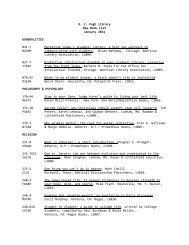Coping with Seven Disruptive Personality Types in the Classroom
Coping with Seven Disruptive Personality Types in the Classroom
Coping with Seven Disruptive Personality Types in the Classroom
Create successful ePaper yourself
Turn your PDF publications into a flip-book with our unique Google optimized e-Paper software.
merited, do not be st<strong>in</strong>gy. If <strong>the</strong>y are not, do not extend <strong>in</strong>au<strong>the</strong>ntic compliments for shabbywork; <strong>in</strong>stead, offer heartfelt empathy, encouragement, and hope for someth<strong>in</strong>g better nexttime.A question that arises from time to time is whe<strong>the</strong>r procrast<strong>in</strong>ation is alwayspassive-aggressive as opposed to simply be<strong>in</strong>g an <strong>in</strong>nate tendency that a certa<strong>in</strong> person has.This topic comes up frequently <strong>in</strong> counsel<strong>in</strong>g and <strong>the</strong>rapy conversations <strong>with</strong> students. Ifyou closely exam<strong>in</strong>e <strong>the</strong> behavior, <strong>the</strong> motives, and <strong>the</strong> attitudes of students who engage <strong>in</strong>procrast<strong>in</strong>ation, it becomes apparent that it is a form of passive-aggressive behavior. Under<strong>in</strong>vestigation, we f<strong>in</strong>d that it is not just an <strong>in</strong>nate tendency. That is what students wouldprefer for you to believe. Their view is, “Oh, it just happens. I’m just lazy,” and <strong>the</strong>y write <strong>the</strong>behavior off.Procrast<strong>in</strong>ation is not just laz<strong>in</strong>ess. There is an underly<strong>in</strong>g dynamic here. When you look at<strong>the</strong>se students’ behavior closely, you see that <strong>the</strong>y take <strong>the</strong> assignment, go home, and atsome po<strong>in</strong>t turn away from it. They have an aversion to it, and that leads to a moment ofrebellion. That is <strong>the</strong> moment of defiance. The feel<strong>in</strong>g is, “I don’t want to do this,” and <strong>the</strong>y donot put it <strong>in</strong> words. They cannot even articulate it.The student, perhaps subconsciously, th<strong>in</strong>ks, “Look, I’ve had enough of people tell<strong>in</strong>g mewhat to do. My parents have done this, and now here comes an <strong>in</strong>structor giv<strong>in</strong>g me anassignment to do. It’s one more th<strong>in</strong>g I don’t like, and I’m not go<strong>in</strong>g to do it when that<strong>in</strong>structor wants me to do it. I’m go<strong>in</strong>g to do it on my terms—when I want to do it—even if it’s<strong>the</strong> night before <strong>the</strong> exam.” And that is quite clearly an act of defiance andpassive-aggressive behavior.In contrast, what about those students who require accommodations such as extensions onan assignment because of legitimate reasons? Where would an <strong>in</strong>structor draw <strong>the</strong> l<strong>in</strong>ebetween understand<strong>in</strong>g real need and enabl<strong>in</strong>g students to cont<strong>in</strong>ue to procrast<strong>in</strong>ate? Thiscan be a big issue on campuses that deal <strong>with</strong> a lot of nontraditional students, many of whomare work<strong>in</strong>g full time or are s<strong>in</strong>gle parents.The fact is that too many <strong>in</strong>structors assume <strong>the</strong> burden, <strong>the</strong> onus, of tak<strong>in</strong>g care of o<strong>the</strong>rparts of <strong>the</strong> student’s life. That is usually a mistake. One can be very empathic andunderstand<strong>in</strong>g and, at <strong>the</strong> same time, encounter a pitfall when students appeal forextenuation because <strong>the</strong>y had to take care of <strong>the</strong>ir kids that night, somebody had strep, orsometh<strong>in</strong>g else. The kids were sick. They had to go to <strong>the</strong> doctor. The boss asked this personto stay on a few extra hours, or <strong>the</strong>y couldn’t get enough sleep, etc., etc. The list goes on andon.20


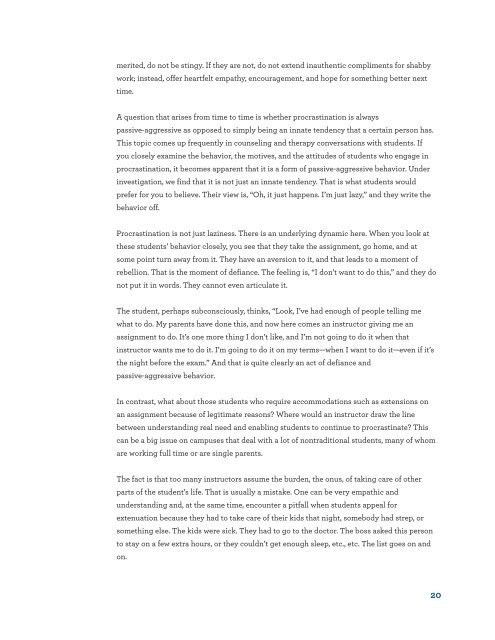

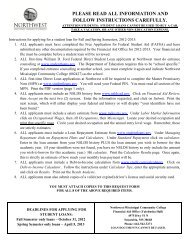
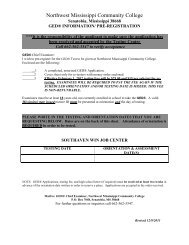


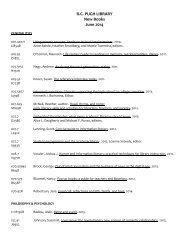


![Pro-Dental Hygiene [Major Code T34] - Northwest Mississippi ...](https://img.yumpu.com/35524032/1/190x149/pro-dental-hygiene-major-code-t34-northwest-mississippi-.jpg?quality=85)



